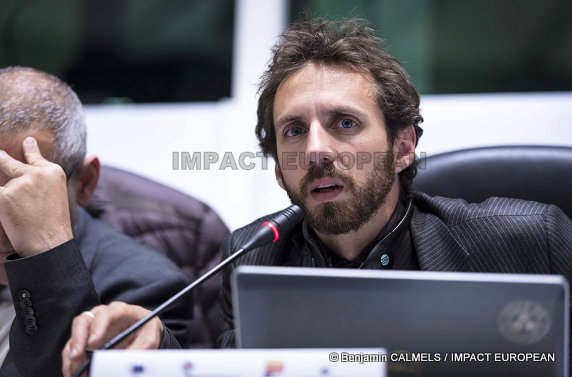Benjamin CALMELS
Eric Recoura, as director of the International Action of the city of Grenoble, is one of the architects of the second edition of the Biennial of cities in transition. It is easily defined as a “pure Grenoble product”, but the one who now manages a team of 15 people has a path turned towards international which he has never turned away. He first integrates the Ministry of Foreign Affairs into a function where he deals with film festivals in Spain and cultural centers in Mauritania. After some experience abroad, he returned to France on a post related to decentralized territorial cooperation. He then joined the city of Grenoble 7 years ago. At the same time, he teaches at several universities in France and around the world and chairs ARRICOD, an association of European and international action professionals from local authorities.
Meeting at the Palais des Sports in the capital of the Alps
The words have a meaning and Mr. Recoura is proud of his job title: “The action, it moves, because we drive throughout the year projects, cooperation programs, exchanges with many cities of the world. world without counting animations and events “. The stage is set. Mr. Recoura is a man of the land and claims it.
“We adopt a posture where we learn from our partners,” he says. No question of exporting “excellence” to the French. The key to success in transition is modesty. As for the participative budget of the city of Grenoble, set up 4 years ago now: “We went to the city of Cascais in Portugal which had a much older and developed experience than ours”. Today, Grenoble has 19 cooperation agreements with cities around the world, some of which were signed 60 years ago. Suffice to say that it is not his first try. The novelty is the constitution of a network of cities in transition, like the many, present at the Biennale.
According to Mr. Recoura, the city at large is the right place to meet the challenges of yesterday and today. It is “the human scale of proximity, the one where people are involved” and whose good ideas inspire beyond its borders. By taking a step back on Franco-German twinnings after the war, he underlines the vital importance of local relations in the peace process with Germany. “An exchange of fanfares or football clubs, these are populations that have been brought to really exchange and welcome home, only 10 or 15 years after the most deadly conflict that the planet has known! The problem is not so much a question of scale as of skills. Decentralization has led municipalities to take on a large number of issues. Today, the transition is, in fact, mainly the result of local public policies.
Mr. Recoura is not meant to defend the European institutions, receptacles of transfers of sovereignty, but also of the hostility of a part of the peoples. We must simply make sure that we remain pragmatic: “The idea is to bring to public knowledge the services that Europe can give it,” he says. Although he readily admits that politicians are reluctant to explain what he is doing in order to “keep a permanent scapegoat”. Mr. Recoura confides that it is indeed the European Commission that, for example, financed part of the international summit of “cities against free trade treaties”, which includes Grenoble, in February 2017. “It may seem crazy but she had more interest in making the democratic debate live. Maintaining the pressure to bring out alternative solutions is also “moving the lines” in the interest of the people of Grenoble. Point of friction and not least regarding the CETA, the opening of the public markets of the local authorities to the competition. In Grenoble, “we offer local bio in school canteens and we will have a blockage at this level! ”
International action also covers the issue of welcoming immigrants. “It’s a Grenoble tradition that goes back to the existence of the city”. Keeping track of the cultures that have enriched and enrich the agglomeration still today, this is the stated objective of the municipality. “The best way to do this is often to establish cooperation agreements with the territories of origin,” says Recoura. He cites the example of a highly symbolic twinning with the city of Corato in Italy. Following successive waves of immigration during the twentieth century, coral community is now strongly represented in Grenoble. “Every year we organize cultural events that put a country in the spotlight. Currently, we are in the Romanian season with the organization of debates, conferences around the place of Romanians in our city. We also connect citizens with cultural and artistic structures and make sure that children can eat Romanian at school for a day. ” The idea is to celebrate festive moments with the whole population. This promotes living together.
Grenoble “accelerates transitions” according to a slogan chosen to promote the Biennial. When Pablo Servigne, intellectual sponsor of the event, bet on the collapse, Mr. Recoura agrees while rebelling against this “incredible form of global blindness.” We must look at “resilient cities, those that have experienced real shocks and can reinvent local life.” It also means a new way of doing things internationally, by making more use of the Internet, for example. “Taking a plane every 4 mornings to watch as the world goes on is sometimes shocking! He says with conviction, at the same time that, in another register, ecotourism plebiscite more and more the trip without plane. “As president of my association, I launched reflections on the meaning of our profession in a world without oil. Some of my colleagues are still very far, “he says. “They can be convinced, but in their own organization, they are 20 years of this reflection.”

More Stories
The Foire du Trône celebrates its 60th anniversary
Trenitalia: improves travel solutions for its passengers by reducing carbon emissions
ALL IN GREEN FOR ST PATRICK’S DAY